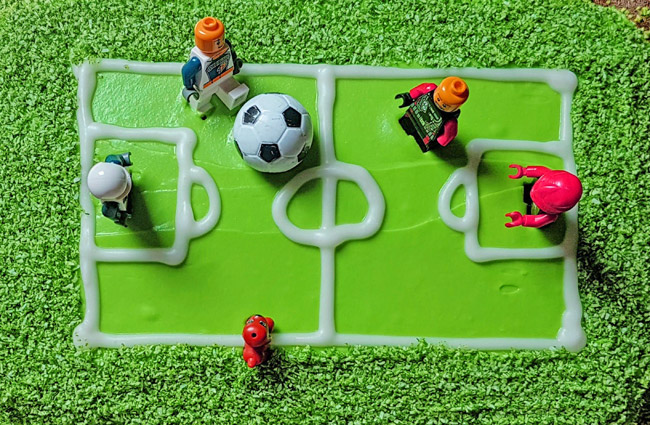Nutrition is exceptionally important for soccer players. Proper nutrition is a critical component of a soccer player's training regimen. A well-balanced diet tailored to their specific energy expenditure, training intensity, and individual needs is vital for peak performance, injury prevention, and long-term success in the sport.
 edible football field
edible football fieldTraining and Competition
Football is a very physically demanding sport. Training can be once a week to full time for professional players. Games are played once a week, for a regular season competition. Tournaments, like the World Cup, will cover several weeks, with teams playing more regularly at the start, and progressing further if they win games. Recovery time of 4–7 days is allowed between games.
The game involves long bouts of running with short bursts of high intensity sprints. Energy expenditure can be very high, with the inners and forwards covering slightly more ground than defenders. The goalie does minimal running during a game, and needs to move sharply to save the ball from entering the goals. However, energy expenditure for all players can be high due to training loads.
Common Nutrition Issues
The game requires a combination of speed, agility along with strength. High carbohydrate levels are required for the high aerobic workload of training and competition. Low body fat levels are an advantage to assist with speed and agility. Hydration is also a concern for players given the game format doesn't allow for regular player changes, or on field drinks.
Body fat levels
For good speed and agility it is wise to keep body fat levels under control. Measuring skinfold levels regularly will allow monitoring of body fat levels. Body fat levels are of particular concern if players have an off-season, when there is greater chance for energy imbalance. During this time, players need to aim for decreased energy intake to match the lack of training.
The Training Diet
Soccer is predominantly an aerobic activity, requiring some strength and power. Energy requirements will vary between players depending on their position on the field and the phase of the season. The training diet for a player should be high in nutritious carbohydrate foods, moderate in protein foods and low in fats.
The most important aspect is to meet carbohydrate requirements. A higher training load along with games will increase the carbohydrate requirements of players. This will range from 5-8 grams of carbohydrate per kilogram body mass. Regular consumption of carbohydrate foods at all meals will allow refueling of muscle glycogen stores. The most important times are after training and games which helps with recovery from each session. One game of Soccer will go close to fully depleting an athlete's glycogen stores, if a whole game is played. If an athlete starts with a full supply they will minimize fatigue towards the end of a 90 minute game, but if the daily diet provides inadequate amounts there may be difficulty in performing optimally. Be sure to regularly include in the diet good carbohydrate sources such as bread and cereals, rice, pasta, fruit and flavored low fat dairy products.
Hydration
Fluid intake is a critical aspect of Soccer. Given the lack of substitutions allowed during the game, and the fact that players are not given drinks on the field, there is a high risk of dehydration over the course of a game. Soccer is often played over the winter months, when sweat losses are lower than the warmer months, however this is also a time when consumption may be low due to reduced thirst. Pre-hydration is crucial to ensure players are over hydrated before they start matches so there is less emphasis needed on fluid consumption during a game. Half time should be a strategic time to maximize fluid intake. Sports drinks will be valuable, providing both fluid and carbohydrate, especially for players involved in more of the game such as the midfielders. Drink bottles, if possible could be left on the side of the field, or behind the goals to sneak a drink during breaks in play, especially on hot days.
Match Preparation & Recovery
Preparation for and recovery from games is important to get the best performance every week. Team travel will also add an element of challenge to recovery and preparation.
Consuming a high carbohydrate, low-fat meal 3-4 hours prior to a match plus drinking small amounts continuously will keep you fueled and hydrated. Small carbohydrate snacks can also be eaten 1-2 hours before a game to top up fuel stores. Liquid carbohydrate options can be consumed during the match to keep energy levels, blood sugar levels and fluid levels up. Ideas for snacks before the match include fruit – fresh or dried, cereal bars, crackers, yogurt and jelly sweets. Fluids suitable to consume during the match include water, sports drinks, and cordials.
Recovery from a match involves replacing lost fluids and electrolytes, refueling depleted carbohydrate stores and repairing muscle damage. Liquid options are best immediately after training and matches to replace fluid and nutrients, followed by a more nutritious and filling meal option later that includes carbohydrate, protein and other nutrients. Suitable recovery foods for immediate consumption include yogurt, fruit, flavored milk, cereal bars, sandwiches, plus some fluids.
Alcohol Intake
Often team sports are associated with 'having a few drinks' after the game, and in many cases considered to be part of team bonding. There is no problem with having an alcoholic beverage after a match, but ideally players need to rehydrate with water and other fluids, plus follow important recovery strategies to refuel before doing so. Professional athletes also need to be aware of team regulations, the performance detriment of alcohol, plus the effects on recovery. All that along with the media attention that is attracted to elite player behavior in public after alcohol consumption!


 Upcoming Events
Upcoming Events